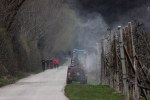News
Where pesticides do not belong
Once applied, pesticides will not remain in their target areas but become distributed over wide areas by wind and weather. A recently published study in South Tyrol detected 32 pesticides in public areas such as schools and playgrounds, some of them all year round. Some of the substances are hormonally active and are suspected of being carcinogenic. The authors of the study, from Italy, Austria and Germany, see an urgent need for action. Measures to protect the population include, for example, improved application techniques, strict observance of wind conditions and a switch to pesticide-free cultivation methods.
The drift problem
This is not the first scientific study of this kind in South Tyrol. For example, in 2017 a study by the Umbrella Organisation for Nature and Environmental Protection and CIPRA South Tyrol already detected pesticide residues on children’s playgrounds. In view of the latest results, both organisations are demanding that South Tyrol finally take rigorous measures in respect of pesticides in order to protect sensitive zones and comply with EU requirements. Otherwise, South Tyrol would only be a “land of biodiversity” on paper. Andreas Riedl, Executive Director of CIPRA South Tyrol demands: “Zero drift must be implemented as soon as possible and not just sometime in the future!”
Polluted soils
Pesticides spread not only in the air, but also in the soil. A recent study by Agroscope in Switzerland shows that even soils that have been farmed organically for more than two decades can still contain pesticide residues in low concentrations. Germany, meanwhile, is severely restricting the use of glyphosate with its revised Nature Conservation Act and has decided to ban it by the end of 2023. In future, pesticide use will also be banned in protected areas and on the edges of water bodies.
Sources and further information:
Year-round pesticide contamination of public sites near intensively managed agricultural areas in South Tyrol (Springer Open, en), DVN – Wissenschaftliche Studie: Abdrift bleibt ein Riesenproblem (Dachverband für Natur- und Umweltschutz in Südtirol, de), Bundeskabinett bringt Gesetz und Verordnung zum Insektenschutz und Glyphosat-Ausstieg auf den Weg (BMU, de), Auf Spurensuche nach Pestiziden in Schweizer Landwirtschaftsböden (Naturschutz, de)





